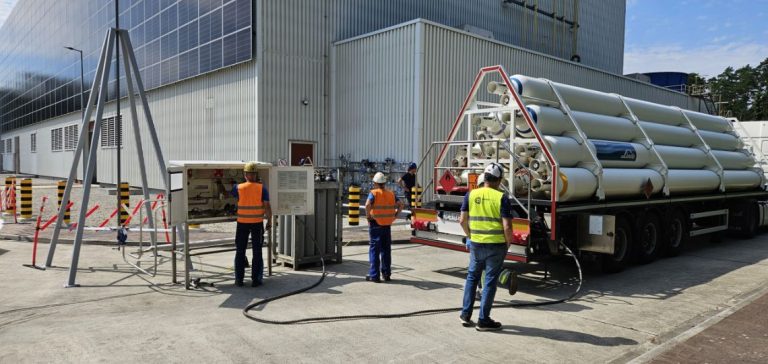Polenergia, the largest private energy group in Poland, recently successfully conducted the first hydrogen co-combustion tests in the country. These tests took place in Podkarpacie, at the Nowa Sarzyna Cogeneration Plant (NSCP) owned by Polenergia. The company has also obtained a building permit for the H2HUB Nowa Sarzyna project, which plans to install a 5 MW electrolyzer for green hydrogen production. This advancement marks a significant step in Polenergia’s strategy to decarbonize Poland’s energy sector.
The tests were carried out on one of NSCP’s natural gas turbines, with a capacity of approximately 40 MW. Although the turbine was not originally designed for hydrogen combustion, the results exceeded expectations. The goal was to achieve a 10% hydrogen share in the fuel, but the tests achieved a volumetric hydrogen concentration of 15%. These results pave the way for increased hydrogen use in energy production, thereby reducing greenhouse gas emissions.
A Decisive Step Towards the Use of Green Hydrogen
According to Iwona Sierżęga, Member of the Management Board of Polenergia S.A., the company’s objective is to use green hydrogen for emission-free transport, heat decarbonization, and, in the long term, electricity production. “At Polenergia, business development goes hand in hand with the introduction of innovations that can change the face of the entire energy sector in Poland,” said Ms. Sierżęga.
The tests were conducted using grey hydrogen, delivered by battery trucks. Ultimately, green hydrogen, produced through the electrolysis process from renewable energy, will be supplied by the installation built in Nowa Sarzyna. Several companies participated in the tests, including Thomassen Energy, Bilfinger Tebodin, Biproraf, Promont, Valmet, and Linde. The Office of Technical Inspection was also involved in developing and implementing the necessary hydrogen supply installations, as well as adapting existing devices in the fuel system for this purpose.
The H2HUB Nowa Sarzyna Project in Full Swing
The H2HUB Nowa Sarzyna project, with a capacity of 5 MW, has just obtained a building permit for an installation for the production and filling of green hydrogen. Emilia Makarewicz, Director of Hydrogen Project Development at Polenergia, emphasized that this is a key step bringing the company much closer to implementing the project. “The electrolyzer is the heart of the hydrogen production node, a key element that will enable hydrogen production using water and the green energy we produce,” she stated.
Hystar AS, the supplier of green hydrogen production technology for the H2HUB Nowa Sarzyna project, has completed factory tests of all eight electrolyzer stacks. The stacks, made using iridium and platinum, are the main process elements of the electrolyzer. The finished stacks have been transported to a plant near Gdańsk, where they will be connected to the rest of the electrolyzer components.
A Strategy Focused on Green Hydrogen
Green hydrogen production is a central element of Polenergia’s strategy. The group, one of the leaders in renewable energy in Poland, is conducting an advanced program to develop the production of this raw material. Its components include the H2Silesia project, a large-scale green hydrogen factory in Upper Silesia with a capacity of approximately 105 MW, and the H2HUB Nowa Sarzyna project located at NSCP. Polenergia is also developing further hydrogen projects.
Mirosław Rokicki, Technical Director and Member of the Management Board of Polenergia Elektrociepłownia Nowa Sarzyna (NSCP), stated: “We aim to green the energy produced in the gas-steam block. The first necessary step was to implement the technology of mixing natural gas with hydrogen in a constant, stable composition and safe, fully controlled combustion of this mixture in a gas turbine not factory-prepared for such a process. Achieving this stage paves the way for decarbonizing not only electricity production but also heat energy.”
Funding and Future Prospects
The H2HUB Nowa Sarzyna project has received funding from the National Fund for Environmental Protection and Water Management (NFOŚiGW). This financial support is essential for advancing the development of green hydrogen technologies in Poland. Polenergia also plans to increase the hydrogen share in the fuel, a long-term process dependent on market conditions.
Polenergia’s advancements in green hydrogen represent a significant contribution to Poland’s energy transition. By integrating green hydrogen into energy production, the company aims to reduce greenhouse gas emissions and promote sustainable energy solutions. These innovative projects could transform Poland’s energy landscape and serve as a model for other countries.






















